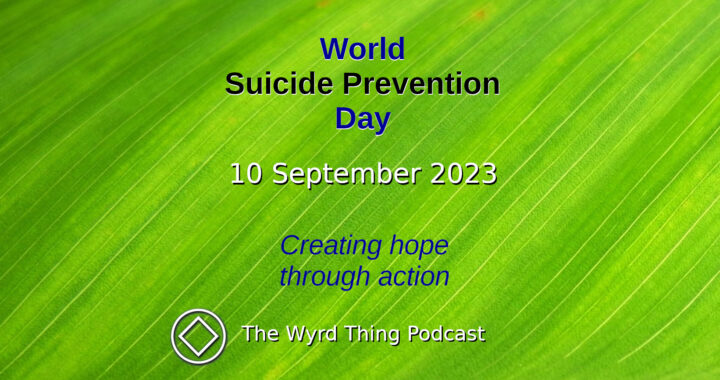Summary
Today is World Suicide Prevention Day: Creating hope through action! This day we raise awareness around the globe that suicide can be prevented.
Scoping
September the 10th is declared world suicide prevention day by the WHO. In this context, we talk about mental health. The vast majority of actual suicides is mental health related, and that‘s the main topic here.
But before we dive into the actual topic, I start with a small detour. I was quite close to two people who died from cancer. In one case the person itself spoke about ending their own life „when it‘s time“, in the other case the question was discussed with members of my family. Both didn‘t do that in the end. And one lesson I took from that is: It takes energy to end your own life. As long as you have enough of that, it‘s too early. Which is why I support assisted suicide for such cases, but that‘s a different story.
A few numbers
WHO lists the total number of suicides as 700,000 per year. It is the fourth most leading cause of death globally in the age group 15 – 29. In Germany, in 2021 9,215 people killed themselves. In the same time, 2,562 people died due to traffic accidents. Figures are similar over Europe, so for example in England and Wales, 5,583 people committed suicide. In the same time, 1,608 people died in traffic accidents in the whole of the UK.
Some subjective medical background
When I was 18, so back in last millennium, we still had obligatory military service in Germany. But there was an option to refuse that and do 15 month of replacement service instead of 12 month of military service, which I did.
I did this in a psychiatric institution, working mostly with people who had been diagnosed with schizophrenia, some with bipolar disorders. I have learned a few things about suicide there which I still assume to be correct.
One of our psychologists made me estimate how many people died from traffic accidents compared to suicide. I assumed that traffic accidents were the more common cause of death. They were not at that time, they are not now. But we talk less about it. The stigma was strong, the stigma is still strong.
Second, I learned that it is a myth that people who „just attempt suicide“ „don‘t mean it“. It‘s a spectrum, with vague thoughts about killing yourself on the one end and actual suicide on the other. People suffer in any place within that spectrum.
Attempted suicide in the past is still the biggest risk factor for a suicide in future.
Third, suicides happen at the start or end of a depressive episode. Someone who is deep into a depression doesn‘t have the energy for a suicide.
With this understanding that suicide usually is the fatal result of the dangerous but generally treatable disease depression, all talk about respecting someone‘s wish to die turns utterly nonsense.
Personal experience
I first stepped slightly into the abyss of suicidal thoughts at the age of seven. We had just moved about 400 km away. Family life had some disturbances which don‘t belong here in detail, I had trouble finding new friends and missed my old ones, and on top of that all of my four great-grandparents who were still alive when we moved away died in a quite sudden succession. I decided it would be probably for the best if I don‘t wake up the next morning, stopped breathing and discovered that I was not able just to die by deciding not to breath any more. It was the only time in life a made something like a suicide attempt, even such a feeble one. But the thoughts stayed with me, sometimes more prominent, sometimes less. They stopped completely on one specific day when I was about 18.
It was the day I realized that I am gay.
My very first thought about that was: As if I don‘t have enough trouble without that. The second: What if this is the cause of the trouble? At least that‘s a reason. I didn‘t really know what to do with that information, but the suicide thoughts were blown away.
A queer perspective
Queer teens still have significantly higher suicide rates than other teens, proving claims from mainstream society that „everything is fine now“ wrong. Even in Western Europe. And it‘s worst for trans youth. And remember, only because a person only thinks about suicide but doesn‘t do it in the end doesn‘t mean that they are having a great time.
For queer adults, the scars from growing up may be hidden under whatever armour they have acquired in that process, but they are still there. Everyone has their own backpack of good and bad experiences, and they are usually not visible from outside.
A heathen perspective
Havamal 71 is:
The halt can manage a horse,
the handless a flock,
The deaf be a doughty fighter,
To be blind is better than to burn on a pyre:
There is nothing the dead can do.
There is no doubt to me that this means that being dead is unwanted and therefore suicide is wrong. Nevertheless, I get the impression in heathen circles that quite a lot of heathens have different ideas. Some of them come from a perceived Viking warrior ethos, which idolizes an „honourable death“. More come from the idea that the free will of people has to be respected under all circumstances. „He wanted to die, and I respect that“ may be easier for some people to cope with. It seems easier to handle than „He didn‘t get his depression treated well enough and therefore died“.
The typical sentence of people who consider suicide is: „I don‘t want to live like this any more“. There are quite obviously two solutions to this, one of them is living differently. But sometimes people need help to find their right, different way of living.
The Havamal tells us a lot about friendship, too. It‘s actually a mixed advice, differentiating real friends and false friends, but also shallow friendships and deep friendship. But the thing to achieve is: Be a good friend. Havamal 44 tells us:
If you find a friend you fully trust
And wish for his good-will,
exchange thoughts,
exchange gifts,
Go often to his house.
So the bottom line from a heathen point of view is to me: Be a good friend. Care for each other.
Conclusion
First of all, we need to fight the stigma around mental health. This has improved in the last 30 years. It has not improved enough, otherwise the figures I started with would look less dreadful.
We need to understand depression and bipolar disorder as diseases like cancer or diabetes. If we suspect that people around us suffer from them, the right thing to do is to convince them to see a specialist for a proper diagnosis.
And if we learn that people around us actually suffer from these diseases and hopefully get a professional therapy: Be kind, understanding and supporting. Especially if they seem a bit unapproachable. Be a good friend. Not a fool who wants to party with other people as long as possible but disappears when responsibility calls.
Jens
Sources and further reading
- WHO Factsheet Suicide, August 2023
- Destatis, Causes of death: Suicide (German)
- UK Office for National Statistics, Suicides in England and Wales: 2021 registration
- Statista, Anzahl der Getöteten bei Straßenverkehrsunfällen im Vereinigten Königreich von 2001 bis 2022, June 2023 (German)
- Hávamál
- The Trevor Project
- New Research on LGBTQ Teen Suicide Rates, August 2023

